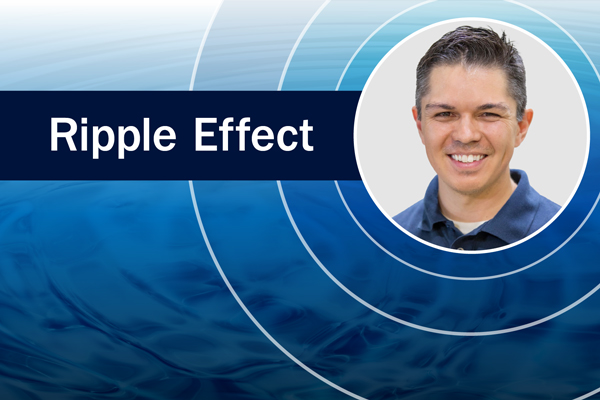Ripple Effect: Why Andrew Simms Rejected the Stock Market for a Career in Marine

How did you end up switching from finance to renewable energy?
It was a long journey. I applied for a lot of finance jobs, but nothing worked out. In finance, I didn’t feel that I would be contributing to the greater good. For me, making money, meeting quarterly deadlines, and trying to maximize stakeholder value wasn’t how I wanted to spend my time. At NREL, we have room to dream big about global problems.
What was it like to follow in your dad’s footsteps?
Some of the NREL technicians I work with knew me when I was a little kid. And I’ve worked with people my dad hired. I feel like I’m building on his legacy, but in a new technology area, which is pretty cool. He worked on a project that studied how well wind turbine models match real-world testing, and they learned a lot of the models were incorrect.
That’s one of the things I see in wave energy. We have all these ideas and models, but we don’t have a lot of real-world data to verify them yet. The problem is really complex: Trying to collect data in the field that’s associated with what you’re seeing in the lab is a serious challenge. I can envision our team working toward a project like my dad’s but for wave and tidal energy.
What were your first official days and weeks at NREL like?
They were awesome. Before NREL, I worked for an app startup. One of my friends was the co-founder and needed someone with a software development background. But I got really burned out. It was hard, a lot of hours, and I was frazzled. I felt like I needed a breath of fresh air.
In business school, I learned about corporate social responsibility—the idea that businesses should take responsibility for their impact on society and the environment. NREL lives and breathes that kind of mission, so I knew working there would give me a sense of purpose. My dad suggested I apply for the technician job because it could “change my perspective on the world,” as he put it.
Obviously, you got the job.
I did and in my third week I had the privilege of climbing up one of the wind turbines. It was hard but so much fun. I knew I’d have to learn very different skills. I worked a few construction jobs growing up and was always taking things apart to try to figure out how they worked. I like to think my interview sold the idea that I was a hard worker. But the reality is I probably just lucked out; there were not many applicants.
This article was originally published by a www.energy.gov
Read it HERE







